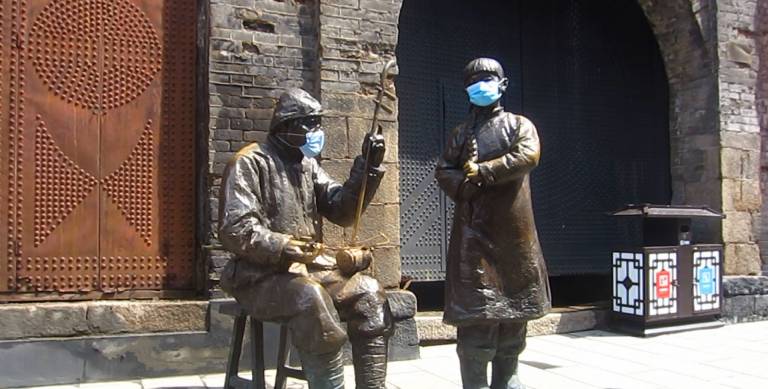CHH MA Online Dissertation Conference 2021
22 May 2021
Thursday 3 June, 8am–3.30pm BST, via Zoom. All warmly welcome. Please join us to support the wonderful China Health & Humanity students and find out about the impressive range of projects they've been pursuing under lockdown. Click on the banner below to receive a joining link.

Download a programme
Programme, am
PART 1: 8–9.30am: Epidemics and Welfare
Chair: Dr Andrew Wear
- Li Yang (CHH): To What Extent did the Plague Influence the Panthay Rebellion in the Late Qing Dynasty (1856 to 1872)? (Supervisor: Michael Facius)
- Ouyang Lexin (CHH): The Spatio-temporal Distribution and Process of Epidemics in Hunan in the Late Ming Dynasty (1522-1644) (Supervisor: Michael Facius)
- Zi Zhongshu (CHH): Development and Failure: China's Disability Protection System (1912 to 1949) (Supervisor: Lily Chang)
PART 2: 10–12 noon: Intelligent Health Management
Chair: Dr Paul Kadetz
- Yuan Dehang (CHH): The History of IVD Development: how various factors have affected the IVD Industry in China (Supervisor: Paul Kadetz)
- Shao Yu (CHH): Key Lessons from the Management of COVID-19 on Intelligent Health Management in the Chinese Health Industries (Supervisor: Benny Dembitzer)
- Li Xinqi (CHH): China’s Online Medical Platforms. To What Extent has E-Commerce Affected the Chinese Health Industry? (Supervisor: Benny Dembitzer)
- Ding Yike (CHH): How does Ali Health Online Pharmacy (on Taobao Site) in TCM impact the quality of patient experience? (Supervisor: Therese Hesketh
Programme, pm
PART 3: 1–2pm: Transforming Traditional Chinese Medicine
Chair: Professor Vivienne Lo
- Li Zhe (CHH): Sensory Integration Therapy:development and mechanism study (Supervisor: Gareth Breen)
- Giulia Capobianco (CHH): To What Extent has TCM Influenced the Practices and Representations of Italian Therapists and Physicians? (Supervisor: Dalia Iskander)
PART 4: 2.30–3.30pm: Chinese Film and Gender
Chair: Dr Daniel Vuillermin
- Liu Qing (CHH): How did Representations of Women and Gender Relations in Chinese Films Change during the Wartime and Civil War Period (1936- 1949)? (Supervisor: Michael Clark)
- Zhang Mengyun (CHH): Female Bodies in Chinese Films during the Sino-Japanese War (1937-1945) (Supervisor: Vivienne Lo)
Supervisors & Discussants
Dr Gareth Breen is interested in the role of desire in the production of religious institutions both within Taiwan and transnationally. He also is interested in alienation as a condition of being in non-humans as well as humans, and the socio-materiality of ghosts. His areas of interest are Christianity in China and Taiwan, religious subjectivities, anthropological theory and the gender of divinity.
Dr Lily Chang is a historian of late imperial and modern China, specialising in the formation of legal measures pertaining to the military during the Second Sino-Japanese War (1937-1945). Her work traces and explores the importance of jurisprudence in the historical development of twentieth-century China.
Dr Michael J. Clark is an Associate Member of the Centre for the Humanities and Health, King's College London, and of the UCL China Centre for Health and Humanity, where he has co-taught the 'Chinese Film and the Body' module since October 2012.
Mr Benny Dembitzer is a British economist who has specialized in the economics of developing countries, particularly on the continent of Africa. He was a member of the team that won the Nobel Peace Prize in 1985. Benny runs a company called ETHICAL EVENTS LTD that provides an umbrella for a range of activities in the wider field of education for development.
Dr Michael Facius is an Associate Professor at Tokyo College, The University of Tokyo, and Honorary Senior Research Fellow at UCL History. Michael's research interests are broadly in the early modern and modern cultural history of Japan in its regional, transnational and global contexts. He is particularly fascinated by the changing patterns of knowledge exchange and circulation and the history of language and translation.
Professor Therese Hesketh is a Professor of Global and Child Health in UCL's IGH/ICH. She also holds a professorship at Zhejiang University. She has published widely on numerous subjects in the public health of China.
Dr Dalia Iskander’s research focusses on malaria and vector-borne diseases. Her doctoral research explored malaria practices amongst indigenous upland Pälawan communities in the Philippines. She is particularly interested in the use of participatory visual methodologies (photography, film and mapping) and understanding how these can be used to explore health as well as potentially facilitate communities (particularly young people and women) to make changes in their lives.
Dr Paul Kadetz is an Associate Professor and chair of the Center for Executive Education at The University of Global Health Equity, Kigali. He is also an Honorary Fellow in the China Centre for Health and Humanity, UCL. Paul works at the intersections of global health, international development and critical medical anthropology. Recent publications include The Handbook of Welfare in China (2017).
Professor Vivienne Lo is the convenor of the MA programme China Health and Humanity. Her research concerns the history of medicine and nutrition in ancient and medieval China. She uses visual and material culture as her main sources. She also publishes about the value of Chinese films for researching Health Humanities. is the convenor of the MA programme China Health and Humanity. Her research concerns the history of medicine and nutrition in ancient and medieval China. She uses visual and material culture as her main sources. She also publishes about the value of Chinese films for researching Health Humanities.
Dr Daniel Vuillermin is a lecturer at the School of Health Humanities at Peking University. He is a section editor of the Palgrave Encyclopedia of Health Humanities and has published in journals including BMJ Open, Life Writing, Caixin among others. Vuillermin is currently writing a cultural history of diagnosis.
Dr Andrew Wear is an Emeritus Reader in History. He was formerly a member of the Wellcome Trust Centre for the History of Medicine at UCl. His research interests are in early modern medicine and more recently in colonial settlement and the environment.
 Close
Close

